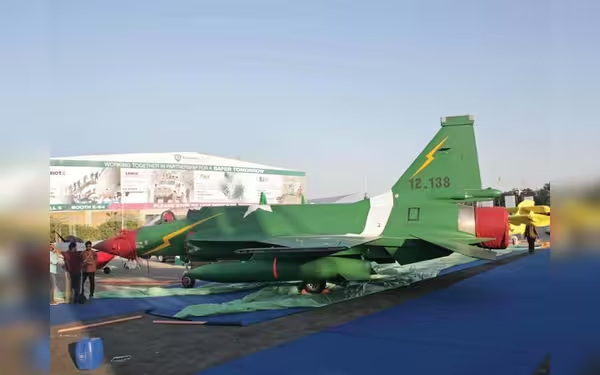Saturday, November 16, 2024 07:47 PM
Pakistan Signs JF-17 Block-III Fighter Jet Deal with Azerbaijan
- Pakistan to supply JF-17 Block-III jets to Azerbaijan.
- Agreement enhances Azerbaijan's military capabilities.
- JF-17 Block-III features advanced technology and versatility.
 Image Credits: tribune.com.pk
Image Credits: tribune.com.pkPakistan signs a deal to supply JF-17 Block-III fighter jets to Azerbaijan, enhancing military capabilities amid regional tensions.
In a significant development for military cooperation in the region, Pakistan has officially signed an agreement to supply JF-17 Block-III fighter jets to Azerbaijan. This deal marks a crucial step in enhancing the airpower capabilities of Azerbaijan, a country located in Western Asia. The JF-17 Block-III is a modern multi-role fighter jet that has been developed by Pakistan in collaboration with China, showcasing advanced technology and combat capabilities.
The announcement was made by the Pakistan Army on Thursday, highlighting the importance of this agreement for both nations. The event included impressive aerial demonstrations and a static display of the JF-17 Block-III, allowing attendees to witness the fighter jet's capabilities firsthand. Such displays not only serve to demonstrate the aircraft's performance but also symbolize the growing defense ties between Pakistan and Azerbaijan.
The JF-17 Block-III is equipped with state-of-the-art avionics and weaponry, making it a formidable asset for any air force. Its versatility allows it to perform various missions, including air-to-air combat, ground attack, and reconnaissance. This makes it an attractive option for countries looking to bolster their defense capabilities without incurring the high costs associated with more advanced Western fighter jets.
For Azerbaijan, acquiring the JF-17 Block-III represents a strategic move to strengthen its military capabilities amid regional tensions. The country has been actively seeking to modernize its armed forces, and this agreement with Pakistan is a significant step in that direction. It reflects Azerbaijan's commitment to enhancing its defense posture and ensuring national security.
The agreement between Pakistan and Azerbaijan for the supply of JF-17 Block-III fighter jets is a noteworthy development in the realm of international defense cooperation. As both countries work together to enhance their military capabilities, it is essential to recognize the broader implications of such agreements. Strengthening defense ties not only contributes to regional stability but also fosters a sense of security among nations. As the world continues to evolve, military partnerships like this one will play a crucial role in shaping the future of defense strategies.













